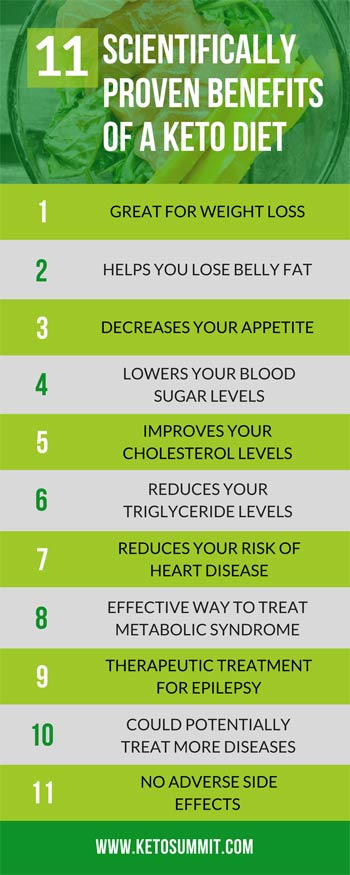11 Scientifically-Backed Benefits Of Keto
You want to know if keto can work for you, right?
If so, then please read on.
The ketogenic diet (aka keto) has become hugely popular over the past year. But is this just another fad? Or is there some science to back up all the amazing benefits?…benefits of keto like:
- Fat-loss,
- More energy,
- Less hunger,
- Stable blood sugar levels,
- Improving triglyceride levels, and even potentially…
- Treating or preventing Alzheimer’s and cancer!
So, in this post, we’ll share with you the real deal. We’ll separate the science from the speculation about the keto diet.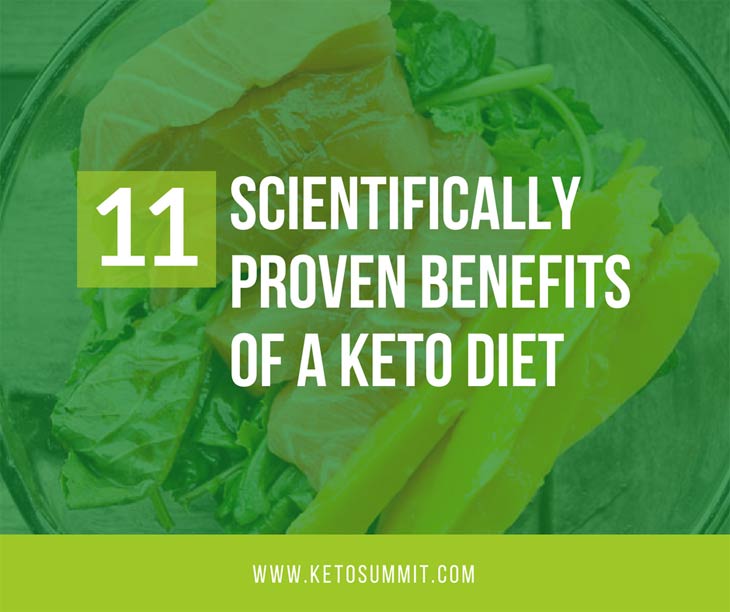
11 Scientifically-Backed Benefits Of Keto
Click on any of the links below to jump straight to that benefit of keto.
- Keto is Great For Weight Loss
- Keto Helps You Lose Belly Fat
- Keto Decreases Your Appetite
- Keto Lowers Blood Sugar Levels And Improves Type 2 Diabetes
- Keto Improves Cholesterol Levels
- Keto Reduces Triglyceride Levels
- Keto Reduces Risk of Heart Disease
- Keto Could Treat Metabolic Syndrome
- Keto Is Used To Treat Epilepsy
- Keto Could Potentially Treat More Diseases
- Keto Is Safe
- Bonus: Additional Reported Benefits of Keto
- Ready To Start A Keto Diet?
Please note that I am not a doctor or registered dietitian. Before starting any new diet and exercise program please check with your doctor and clear any exercise and/or diet changes with them before beginning. The information provided in this post is based on personal research. Citations to scientific papers are linked throughout the article.
1. Keto is Great For Weight Loss
This is perhaps one of the most talked about benefits of keto. And it’s also one of the main reasons why so many people are jumping on board with keto…because keto great for weight loss.
And it’s not just anecdotal evidence. There are quite a few studies on keto weight loss…
Keto is a low-carb diet, and study after study has shown that a low-carb diet is effective for weight loss. Check out these studies:
- Individuals on a low-carb, high-protein, high-fat diet (similar to keto) found they lost more weight after 6 months than those on a conventional diet. (1)
- Low-carb dieters were compared with low-fat dieters, and the low-carb group lost over 3 times more weight on average. (2)
- Within the first few weeks of a 6 month study, women following a low-carb diet had lost more weight than those following a low-fat diet. (3)
Although the initial weight loss is often due to water weight loss and reduced bloating, those following a low carb diet tend to see significant weight loss long term as well.
Keto is GREAT for weight loss because…
There’s still a lot of speculation as to what exactly makes keto so great for weight loss.
But, a few possible reasons are:
- The low carbohydrate intake reduces sugar cravings and in general, makes you less hungry.
- The high fat intake increases satiety (as fat takes longer to digest) and so you stay full for longer.
- The higher protein intake keeps you feeling fuller.
- A healthy keto diet provides you with more nutrients (like essential vitamins and minerals) so your body won’t crave as much food. Another way to think about this is that you’ll be decreasing your empty calories intake.
- A healthy keto diet is anti-inflammatory. This allows your body to heal various health conditions that could be preventing your weight loss.
- A keto diet puts your body into nutritional ketosis, which can reduce cravings and hunger and help you to literally burn your own fat stores up.
Bottom Line:
Bottom Line: If weight loss is your aim, then keto can be a very effective way to get there. And you’ll get a bunch of other benefits too…

2. Keto Helps You Lose Belly Fat
The keto diet doesn’t just help you lose weight, it can actually helps you lose the unhealthiest type of weight: belly fat.
There are several reasons why you’d want to get rid of belly fat:
- It’s been linked to high cholesterol levels as well as increased risk of heart attack, type 2 diabetes, and stroke.
- In fact, extra belly fat can cause problems even if your weight is normal, a condition known as central obesity.
- It can increase your risk of death: one study compared 15,000 adults over 14 years: men and women who had a normal BMI but an unhealthy waist:hip ratio (a way of measuring excess belly fat) were significantly more likely to die prematurely than adults who had a normal BMI and a healthy ratio… by over 50% for women, and 87% for men. (4)
Keto may be effective at losing belly fat
One study specifically measured fat lost from the belly region as compared to total fat lost and found that a larger percentage came from belly fat. Various other studies of low carb and keto diets have found a significant reduction in waist circumference (the exact amount of fat lost was often not measured in those studies).
- One study compared 28 overweight participants and found that men on a very low-carbohydrate ketogenic diet lost significant belly fat. (5)
- Another study found both men and women on a very low-carb ketogenic diet lost significantly more waist circumference than men and women on the control diet. (6)
- This study comparing the effect of a low calorie versus a low carb keto diet for diabetics also found a significant reduction in waist circumference for participants on the keto diet. (7)
Bottom Line:
Several studies have shown that keto is extremely effective in helping lose belly fat (or reducing waist circumference).
3. Keto Decreases Your Appetite
This is perhaps my favorite benefit of keto. But decreasing your appetite is another possible reason why keto helps you lose weight so effectively.
Reduced hunger levels mean it’s easy to not overeat, and keto can help people reduce their food consumption without even trying.
A study compared 53 overweight women: half of them followed a low-fat diet and had their calorie intake restricted while the others were on a low-carb diet and could eat as much as they wanted. The group who cut carbs lost twice as much weight – without intentionally reducing calories. (8)
Another study compared two high protein diets (one keto diet and one higher in carbs). The result? The keto diet reduced hunger and lowered food intake significantly more than the high carb diet. (9)
3 Ways A Keto Diet Decreases Your Appetite:
1. Keto makes you less hungry by affecting the hormones which influence appetite.
Dr. Michael Eades, M.D. suggested back in 2007 that the appetite suppression associated with a low carb diet could be caused by lowered triglycerides. “We all know that the commonest lab finding in people following a low-carb diet is a dramatic reduction in triglyceride levels. This reduction in triglycerides allows the leptin that is already circulating in relatively large amounts to get through to the brain where it can reduce hunger.” (10)
But that’s just part of the story…
A study following 50 overweight individuals on the ketogenic diet found that even though the participants were losing weight, levels of ghrelin were lower than expected. That means their levels of hunger were also likely lower. (11) (The way I remember this hormone is… high ghrelin levels = hangry gremlin.)
Typically when you go on a weight-loss diet, your body produces more ghrelin, which causes you to feel hungry and that often causes you to break your diet.
However, what studies have found is that when you go on a keto diet, your body doesn’t produce extra ghrelin. And so you lose weight while not feeling hungry. (12)
2. Keto helps you eat more protein, which has been shown to increase satiety.A keto diet replaces the carbohydrates in a standard diet with more healthy fats and proteins. And eating more protein is highly linked to increased satiety.
- Researchers have found “convincing evidence that a higher protein intake increases satiety compared to diets of lower protein content.” (13)
- While another study concluded increasing dietary protein to 30% causes an increase in satiety and reduces overall calorie intake. (14)
3. Keto helps you eat more fat, which has also been shown to increase satiety.As explained in the book Fat Detection, “fats do have an effect on satiety and appear to regulate appetite through several mechanisms including the release of appetite hormones and inhibition of gastric emptying and intestinal transit.” (15)
In particular, MCT oil (medium-chain triglycerides) are often used recommended in keto diets. And several studies have found MCTs to be more satiating than long-chain triacylglycerols (LCT). (16)
Dr. Stephen Phinney, M.D., PhD observes, “[It] is becoming more evident that nutritional ketosis can enhance appetite control signals, reduce inflammation and facilitate diet adherence and sustainability. These advantages can go a long way towards supporting your health while not requiring you to suffer through constant hunger and the frustration of roller-coaster weight fluctuations.”
Bottom Line:
Multiple studies have shown that keto helps you decrease your appetite. This might be due to a variety of factors including decreased hunger hormones and the satiating effect of the protein and fat in keto meals.
4. Keto Lowers Blood Sugar Levels And Could Help With Type 2 Diabetes
Registered Dietitian Maria Zamarripa, RD says, “Because the ketogenic diet restricts carbohydrates, blood sugar levels will naturally decrease. The ketogenic diet has some preliminary research as a successful treatment for lowering hemoglobin a1c levels in people with type 2 diabetes.”
This benefit of keto obviously has very important consequences.
What does the science say about this?
In a study of 49 diabetic volunteers, 95.2% of them were able to stop or reduce their use of diabetes medications by following a low carb, ketogenic diet for six months. And the same study found that a low-carb, ketogenic diet was more effective at controlling blood sugar levels than a low glycemic diet. (17)
Why is Keto good for stabilizing blood sugar levels?
As explained in the study above, a keto diet “combines two approaches that, on their own, improve blood glucose control: weight loss and a reduced-glycemic index diet.”
Consuming high carb foods (which are typically also high glycemic index foods) leads to spikes in blood sugar because the carbs are converted into glucose and enter your blood. By consuming mainly fat and protein you avoid these spikes, so your blood sugar stays stable.
And by eating a diet that helps you to lose weight, you’ll also be able to reduce blood sugar levels.
Several other studies on patients with type 2 diabetes have found that a low carb or keto diet improved glycemic control, which is the main aim of diabetes treatment. (18, 19)
“The underlying principle of carbohydrate-restriction and the historic precedents of using the low-carbohydrate diet for type 2 diabetes suggest that the low-carbohydrate approach may be one of the most effective dietary treatments for diabetes.” (17)
A word of caution: if you’re self-administering insulin or any other blood sugar medication you shouldn’t try this kind of diet except under medical supervision, to ensure your medication amount stays appropriate when your blood sugar lowers.
A keto diet can also make you more flexible…
…metabolically flexible, that is.
If you’re metabolically flexible, you can switch between using glucose or fat as fuel for energy production. But why is that a good thing?
Well, if you’ve lost the ability to use fat as an energy source (aka you’re metabolically inflexible) it means you’re dependent on glucose – and when your body is running low on glucose, you feel hungry, tired and bad-tempered…in other words, hangry.
The keto diet can help your body regain the ability to burn fat.
Which means if the glucose runs out, your body just switches to using ketones instead (they’re formed by breaking down your fat stores) – this is super important for your brain, as ketones are the only other energy source it can use (apart from glucose).
This is especially helpful for folks with unstable blood sugar levels.
They’re usually metabolically inflexible and dependent on glucose, meaning they’re constantly hungry and their mood is at the mercy of blood sugar swings.
So regaining metabolic flexibility means they won’t need to snack on high-carb foods all the time, as their bodies are able to burn ketones for fuel when glucose levels are low.
In fact, improving metabolic flexibility could even prevent the onset of type 2 diabetes in the first place.
Bottom Line:
Keto has been shown in several studies to help with lowering blood sugar levels for those with type 2 diabetes.
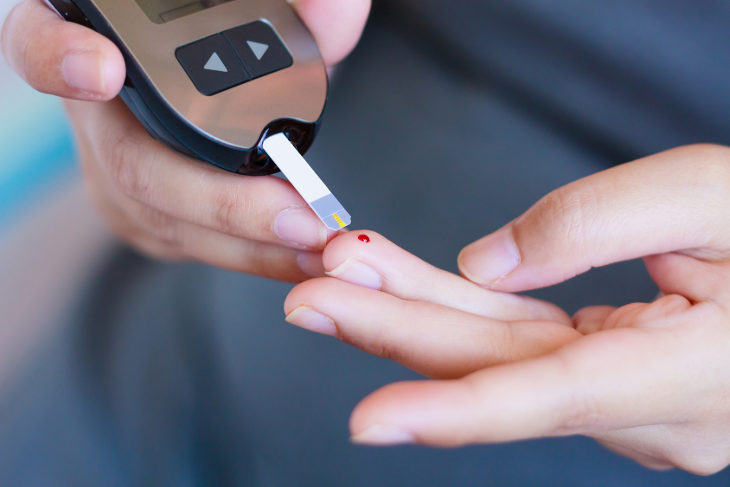
5. Keto Could Improve Your Cholesterol Levels
There’s still debate about whether having high cholesterol is actually bad for you. (20)
But quite a few studies suggest that a low carb or keto diet can raise levels of HDL (or what’s often considered “good” cholesterol).
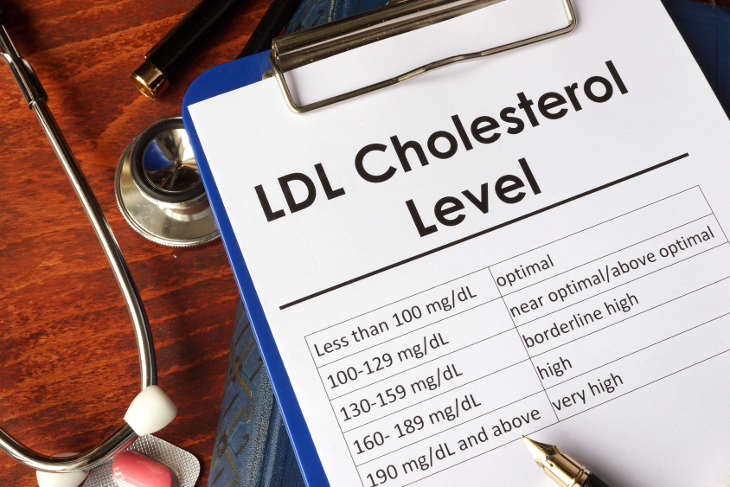
Studies showing keto raises HDL levels:
- A meta-analysis of 13 studies found that very low carbohydrate keto diets increased HDL levels compared to low fat diets over the long-term. LDL levels also increased. (21)
- A review found that keto diets “have been generally shown to compare favourably with low-fat diets in terms of weight loss and improvements in triglyceride and high-density lipoprotein levels.” LDL levels also increased. (22)
- This 12-week study on overweight men concluded that: “weight loss induced by [carbohydrate restriction] favorably alters the secretion and processing of plasma lipoproteins, rendering VLDL, LDL, and HDL particles associated with decreased risk for atherosclerosis and coronary heart disease.” (23)
- This one-year randomized trial found that those on the low carb diet had higher increases in HDL levels. (24)
Bottom Line:
Keto could improve your cholesterol levels by increasing your HDL (“good” cholesterol).
6. Keto Reduces Your Triglyceride Levels
The keto diet has also been shown to be beneficial for your triglyceride levels. And again, this benefit of the keto diet is highly useful for your long-term health.
High triglyceride levels can be dangerous
Triglycerides are a type of fat molecule found in your blood – they’re used by your body to build cell membranes as well as to store energy.
While triglycerides are essential to all humans, high triglyceride levels are linked to higher risk of heart disease. (25)
Keto could help reduce triglyceride levels
If you’re eating large amounts of carbohydrates (aka they’re 60% of your total calorie intake), this study found that your triglyceride levels may be higher. (26)
It’s been shown that the keto diet can significantly reduce triglyceride levels: one study followed 83 patients on a 24-week keto diet and found that their triglyceride levels decreased by approximately 60%. (27)
Other studies have also found keto diets improved triglyceride levels. (28, 29)
Bottom Line:
Research has shown that Keto could help decrease your triglyceride levels, which could lower your risk of heart disease.
7. Keto Reduces Your Risk of Heart Disease
Heart disease has many contributing factors. And several of the health benefits of keto described above (e.g., weight loss and lower triglyceride levels) are linked to decreasing risk of heart disease.
But that’s not all…
This systematic review and meta-analysis of various clinical trials found that a low carb diet had “favourable effects on body weight and major cardiovascular risk factors.” (30)
And more specifically, one detailed review found that a keto diet had beneficial effects on various cardiovascular risk factors. (31)
But doesn’t all the saturated fat in keto diets cause heart disease?
As Stephan Guyenet explains, the theory that saturated fat causes heart attacks typically follows the following logic:
- Eating foods high in saturated fat increases your blood cholesterol levels.
- High blood cholesterol increases your risk of having a heart attack.
- Therefore, eating foods high in saturated fat will make it more likely that you’ll have a heart attack.
However, the majority of studies do not show a link between eating saturated fat regularly and higher blood cholesterol levels. (32) And that destroys the diet-heart hypothesis (that saturated fat causes heart disease by increasing cholesterol).
A large-scale meta-analysis review of 21 studies (involving more than 300,000 participants) also concluded that “there is no significant evidence for concluding that dietary saturated fat is associated with an increased risk” of cardiovascular disease. (33)

Bottom Line:
Keto has been linked to improving various heart disease risk factors.
8. Keto Could be an Effective Way To Treat Metabolic Syndrome
High fasting blood sugar levels, high blood pressure, central obesity, and high levels of triglycerides are the key symptoms which define the medical condition known as metabolic syndrome. This illness is strongly associated with increased risk of cardiovascular disease and diabetes.
These symptoms may sound familiar, and that’s because we’ve already discussed how the keto diet can help treat them all.
Their ability to improve these symptoms is why low-carb diets like the keto diet are considered an effective treatment for metabolic syndrome. (34). And if we’re comparing, then this study shows low carb diets to be a better form of treatment than low-fat diets. (35)
Bottom Line:
The keto diet can help improve various symptoms of metabolic syndrome (including high fasting blood sugar levels, high blood pressure, low HDL, and high triglyceride levels.
9. Keto is Also A Therapeutic Treatment For Epilepsy
Many folks don’t know this, but the keto diet was originally designed as a treatment for epilepsy.
It was used as a therapy for epileptic children in the 1920s, but fell out of favor after anti-seizure drugs became more widely available.
However, in recent years, modern clinical studies and high-profile individual stories have shown that the keto diet is an effective treatment. (36). Keto is still used worldwide as a treatment for epilepsy. (37)
The reason keto is so effective at treating epilepsy?
Scientists are still debating the exact mechanisms of how it works. But the thought is that when you’re on a keto diet, your metabolism changes in a similar way to fasting – and fasting has been used as a therapy for seizures since Biblical times. (38) But unlike fasting, the keto diet is a lot easier for patients to stick to and a better long-term solution. Plus, you get essential nutrients!
Pediatric neurologist Dr. Eric Kossoff, M.D. has used a ketogenic diet to treat both children and adults with epilepsy. He mentions, “About 80% of the [adult patients] have never been offered a dietary therapy for their epilepsy before.” He believes in starting treatment with medication, but when that fails a ketogenic diet should be considered.
Bottom Line:
Historically, keto was originally designed to treat epilepsy, and it’s still used worldwide as an effective method of treatment.
10. Keto Could Potentially Treat More Diseases
Excitingly, the keto diet is currently being investigated as a treatment for a wide range of other diseases.
Researchers are studying keto as a treatment for various neurological conditions like Alzheimer’s disease, autism, brain tumors, and bipolar disorder. The diet could also potentially help cure/prevent other types of cancer, treat polycystic ovary syndrome, and reduce severe acne. (39, 40)
Initial studies have been carried out with promising results. The data isn’t conclusive though, as most of these studies were carried out on animals or were trials involving very small groups.
So keep your eyes peeled: there are “new and exciting scenarios about the use of ketogenic diets” being researched at the moment. (41)
Bottom Line:
There’s a lot of scientific interest in keto as an method of treating diseases ranging from cancer to neurological issues.
11. Keto Is Safe!
Good news for everyone worried about potentially negative side effects of keto…
Many studies have been carried out on patients following a keto diet and no serious negative side effects have been reported. Of course, well-conducted studies that follow patients over the course of multiple years are tough in any diet, so this information is based on relatively short-term studies of up to 1 year.
For example, one 6 month study found that following a low-carb/high-fat diet didn’t increase the risk of heart disease, despite the greater amount of fat consumed compared to a standard diet. (42)
And some sufferers of epilepsy follow a strict keto diet throughout their lives in order to keep themselves healthy and seizure-free.
A longer-term study followed 66 patients on the keto diet: after a year, the keto diet had reduced their risk factors for heart disease. Researchers concluded it was safe to use the keto diet long term. (43)
Ketosis is NOT Ketoacidosis and it’s NOT Dangerous
A lot of the initial misconceptions around safety come from folks mixing up ketosis and ketoacidosis.
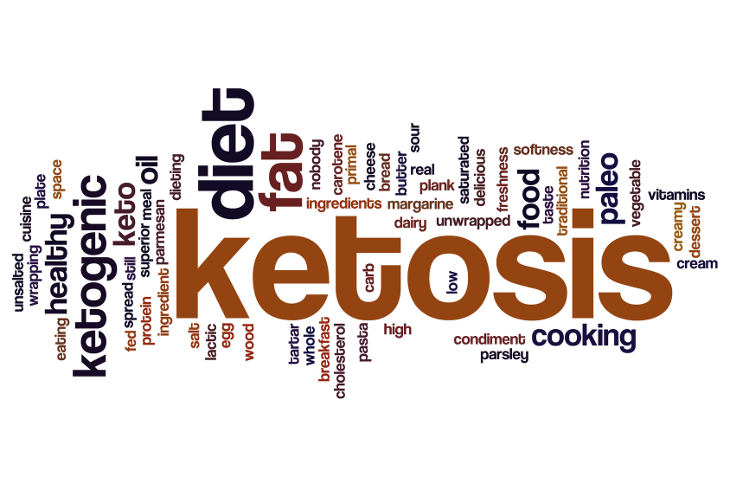
Ketosis is the fat-burning metabolic state your body goes into when you’re on the keto diet.
- Your body naturally goes into ketosis if you haven’t eaten for 6-8 hours…
- …because there’s a lack of glucose in your blood, your liver breaks down fatty acids from your fat cells – forming ketones
- The ketones enter your bloodstream and your body uses them as an energy source. You can also supplement with ketones to raise your blood ketone level.
- When your blood ketone levels are elevated, you’re in ketosis (the state responsible for all the health benefits we’ve been discussing).
- Insulin is the hormone which regulates this process, it makes sure your ketone levels stay in a safe range (by increasing/decreasing ketone production)
- And what does the keto diet do? It limits carbs, causing your blood glucose to drop – putting your body into ketosis without the need for fasting. This is called nutritional ketosis (ketosis caused by your diet).
Ketoacidosis, on the other hand, is a serious medical condition. It occurs in sufferers of type 1 (and end-stage type 2) diabetes and can cause comas if left untreated.
Ketoacidosis is generally caused by a lack of insulin, which causes two problems:
- Glucose can’t enter your cells without insulin, so even if there’s plenty of sugar available in the blood your body can’t sense it.
- There’s nothing to control ketone production – usually high insulin levels will stop ketone production.
When these two problems occur together, you can get into trouble:
- Your body can’t recognize you have high blood sugar levels, so it starts breaking down fats and producing ketones.
- But there’s nothing to control ketone production (since there’s no insulin), so your blood ketone levels just keep on increasing.
- And this combination of high blood sugar levels and high ketone levels upsets the acidity level of your blood (causing all kinds of health issues): a state called ketoacidosis.
But ketoacidosis isn’t something for most folks to worry about. Consult your doctor if you have type 1 (or end-stage type 2) diabetes before starting keto.
Bottom Line:
Several studies ranging 6-months to 1 year have concluded that Keto is safe.
Bonus: There Are Even More Benefits Of Keto
Although they haven’t been backed up by science, there are several beneficial side effects often reported by which keto dieters.
These potential benefits of keto include:
- increased energy levels
- relief from migraines
- healing of heartburn
- decrease in joint pain
- improved sleep patterns
- reduced cravings
- more stable moods and reduces depression (45, 46)
- increased focus
- better memory recall
- getting rid of brain fog
Many of these side effects could be a result of the other, scientifically-proven, benefits of the keto diet: stabilizing blood sugar levels and reducing inflammation are likely to have a knock-on effect on overall well-being.
If you’ve found keto to have helped you with a health problem, please share it on our forum here.
Bottom Line:
There are many other potential benefits to the keto diet, and these can be deduced from anecdotal evidence.
If you’re ready to start a Keto Diet…
There are some amazing benefits of keto. Studies in particular point to keto’s weight loss benefits.
So, if you’re interested in starting a keto diet, then join our 3-2-1 keto meal plans program for an easy, confusion-free way of enjoying keto foods.
Pinterest Image For 11 Scientifically Proven Benefits of a Keto Diet
Please pin the image below so that you and others can quickly and easily refer to the list and read all about the health benefits of a keto diet.
